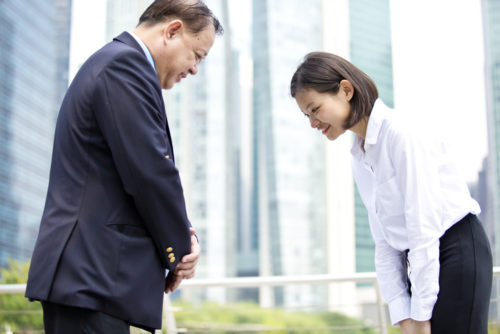How To Say Best Friend In Chinese

30+ Must-know Chinese Honorifics for Being Polite Like a Pro
I never really liked being referred to as "ma'am."
It e'er makes me feel old.
Although it certain beats hearing people shout "lady" to become my attending. It might not be rude in every civilization, merely it definitely isn't polite in my volume!
When it comes to learning Chinese, it'due south vital that you take the time to figure out what's okay and what'southward not okay to call strangers and acquaintances.
The concluding matter you want to do is accidentally offend someone, either by addressing them with a title also formal or besides coincidental.
In Cathay, honorifics play a huge role in gild, so if you really want to reach a loftier level of fluency (or simply sound more than natural), you lot need to commencement incorporating them into your daily language practice.
Download: This web log mail service is available as a user-friendly and portable PDF that y'all tin can take anywhere. Click here to get a copy. (Download)
Exactly How Important Are Chinese Honorifics?
Just similar in English, Chinese people also refer to each other with Chinese pronouns, like "you," "he/she," "nosotros" and "they."
But that's not always the case, and in that location are many situations where using these pronouns is simply unnatural, unnecessary or just flat-out rude.
The last thing yous want to do is offend someone.
And when in Rome, do every bit the Romans do, correct?
In many circumstances, the "Romans" (or in this example, Chinese speakers) utilise honorifics instead of pronouns.
Honorifics are securely embedded into the culture, start manifesting in Imperial China when information technology was used past not-royals to accost their superiors. While linguistic politeness has evolved over time, honorifics are still prevalent in Chinese today for many reasons.
But just how of import are honorifics, and why practise Chinese people use them so ofttimes?
They're a Polite Way to Address Strangers, Acquaintances and Colleagues
Similar to other East Asian counterparts, Chinese people place high social value on strangers. It heavily relates to the concept of maintaining face, which involves showing respect to the people you run across on a day-to-day basis, from that stranger you bumped into on the subway to a new colleague at piece of work.
They're a Way to Recognize Professionals
Whether you lot want to politely address your cab commuter or speak to the owner of an establishment, information technology's of import that you talk to people with humility and respect, especially towards those who are serving you in some sort of fashion.
They're a Sign of Respect for the Elderly
In many Asian cultures, elders are considered respected members of lodge who have helped shape the current and continue to shape the future generation. Even if you know their name, it'south considered boorish to address elders outside of their appropriate honorifics, which we'll discuss later on on.
They're a Style to Show Affection to Loved Ones
There are lots of means that native speakers show their love without maxim, "I love you." They do so with actions, terms of endearment and y'all guessed it—honorific substitutes. While these family unit terms do bespeak rank in the family unit, certain honorific prefixes also signify closeness in the relationship, to bear witness how they're all near and dear to each other's hearts.
xxx+ Must-know Chinese Honorifics for Being Polite Like a Pro
Now let's movement on to those Chinese honorifics and so nosotros tin can amend your linguistic fluency, also as help you get more respectful of Chinese civilisation!
Chinese Honorifics for General Titles
Only like how y'all might address others as "Sir" or "Ma'am" if you don't know the other person'southward name, Chinese speakers as well employ similar titles when speaking to strangers.
先生 (xiānshēng) — Sir
夫人 (fūrén) — Madam
If you lot know the person'southward concluding name, you could address them past their surname + their appropriate championship.
先生 as well translates to "Mr.," but the correct manner of addressing someone in Chinese with the last proper name of 李 (lǐ) would be 李先生 (lǐ xiānsheng).
Addressing the ladies, on the other hand, is not equally straightforward.
Unmarried women would carry the title "Miss" or 小姐 (xiǎojiě), thus someone with the last name 张(zhāng) would be referred to as 张小姐(zhāng xiǎojiě). 1 thing to notation is that the term 小姐 on its own is slang for "prostitute" in some parts of Prc. It's also sometimes used to phone call a eatery waitress, though information technology's all-time to err on the side of caution.
Considering it's not common practice to take the husband'southward last proper name in China, the Chinese version of "Ms.," which is 女士 (nǚshì), really refers to a wife that uses her maiden proper name. Then if her maiden name is 陈(chén), you could phone call her陈女士 (chén nǚshì). 女士 is sometimes used to refer to older single women, so whenever you're in doubt, go with that title.
At present if the adult female you want to accost is married and has taken her husband'south last name, yous could refer to her in one of two ways:
太太 (tàitai) — Mrs. (informal)
夫人 (fūrén) — Mrs. (formal)
太太 (tàitai) is used in personal relations. So in casual, everyday situations, y'all would say 李太太 (lǐ tàitai) when referring to Mrs. Li in Chinese. In formal or business contexts, you would address her as 李夫人 (lǐ fūrén).
Chinese Honorifics for Family Members

You might know all the vocab for different members of the family, and might've fifty-fifty mastered the family introductions in Chinese. Even so, depending on who yous are in the family unit, or whether you're referring to your own household or someone else's, the proper noun or championship of each fellow member tin can vary.
Sounds a little complicated, I know. Simply think of information technology like having pet names for your loved ones. Yous might call your partner "babe," but you wouldn't necessarily refer to him or her every bit "baby" when you're speaking to others, peculiarly with acquaintances or someone similar your boss.
Talking Amidst Family unit Members
As previously mentioned, honorifics are sometimes used amidst family members to show not only rank but likewise affection amid one some other, and they'll do then by using a certain prefix + position in the household.
As a respectful way to address your parents, y'all could use the prefix 老 (lǎo), which in this example means "elder" rather than "old."
老妈(lǎo mā) — Mom
老爸(lǎo bà) — Dad
Parents can also use it with each other, calling i another 老公 (lǎogōng) for "husband" and 老婆 (lǎopo) for "married woman," which are similar to the terms "hubby" and "wifey" in English language.
Another prefix family members may employ is 阿(ā), significant "to flatter." It's ordinarily used with grandparents. "Grandma" would be 阿婆 (āpó) and "Granddaddy" would be 阿公 (āgōng). You tin can also use this prefix with other family unit members.
To differentiate between siblings, the prefix 大 (dà) meaning "large" may be used for the oldest brother or sister, as seen below.
大姐(dàjiě) — Big/Oldest sister
大哥(dàgē) — Large/Oldest brother
Equally for the youngest siblings, the prefix 小 (xiǎo) pregnant "small" or "immature" can be added to the terms for little brother and sister.
小妹(xiǎo mèi) — Little/Youngest sister
小弟(xiǎodì) — Footling/Youngest blood brother
Referring to Your Family unit with Others
Usually when talking about your family members with others, the common family terms are fine to employ. But a polite way to refer to older family members and relatives would exist to employ the prefix 家 (jiā), which translates to "abode." Though as a prefix, it manifests as the possessive pronoun "my."
家母(jiāmǔ) — My mother
家父 (jiāfù) — My father
家姐(jiājiě) — My older sister
家兄(jiāxiōng) — My older blood brother
Do annotation that these are formal titles, and that it's perfectly acceptable to employ common family unit terms, introducing your father every bit 我爸爸(wǒ bàba) and your mother as 我妈妈 (wǒ māma), as indicated in the dialogue below.
In this conversation, a man introduces his family members by saying 我 (wǒ) rather than 家 to say "my."
Talking About Someone Else'south Family
At present if you're speaking nigh someone else'due south family and want to acknowledge them politely, you could use 令 (lìng), which ordinarily means "to control" only translates every bit "your" when used as an honorific prefix. These terms are all quite formal but are still used in contemporary speech.
令堂(lìngtáng) — Your female parent
令尊 (lìngzūn) — Your male parent
令爱(lìng ài) — Your daughter
令郎(lìngláng) — Your son
Some other way to say "your son" is 贤郎 (xiánláng), which literally means "young, virtuous man." This can exist used when talking about a friend's son.
If yous don't know the person you're speaking to very well, you have the choice to utilise the formal prefix 贵 (guì), normally meaning "expensive" but translates to "your" when used as an honorific.
贵家长(guì jiāzhǎng) — Your parents
贵夫人(guì fūren) — Your wife
贵丈夫(guì zhàngfū) — Your married man
贵子女(guì zǐnǚ) — Your children
贵子弟(guì zǐdì) — Your sons
Chinese Honorifics for the Elderly

Most of the time, people address their elders according to their familial relationship and not past their proper name. For elder family unit friends, you could phone call them by their surname + 叔叔 (shūshu) or 阿姨 (āyí) , meaning "Uncle" and "Auntie" respectively. If you're addressing other people's parents that are around the same age every bit your parents, you may also refer to them as 叔叔 or 阿姨. Yous tin can use those titles with strangers besides, then long equally they're close to your parents' age.
If the elders in question aren't necessarily seniors but merely a flake older than you, you tin telephone call them 大哥(dàgē) for "big brother" and 大姐(dàjiě) for "big sis," fifty-fifty if yous aren't related.
General titles similar 先生 (xiānsheng) for "sir" or夫人 (fūrén) for "ma'am" are fine too if they're close to your age. If you know their occupation, you may use the honorifics in the side by side department.
Chinese Honorifics for Professionals
In the Workplace

If you're speaking to someone in the workplace that y'all don't know well, may that be a subordinate or boss, feel free to employ the format of surname + appropriate general title, equally shared above.
For colleagues that share the aforementioned terminal proper noun, a respectful manner to differentiate between them would be to use the prefixes 小 and 大 + surname to signal who is younger and who is older. For example, two coworkers with the last name of 王 (wáng) would be called 小王(xiǎo wáng) and 大王(dà wáng). The older coworker could be fifty-fifty called 老王(lǎo wáng) every bit an indication of seniority.
To address your boss, you can call him or her by the surname + 总 (zǒng) , which is also the term for "principal." So Mr. Huang or would be 黄总 (huáng zǒng).
Occupational Titles
Professional titles are as well a respectful mode to address the people yous interact with on a daily ground. Hither are some other common occupational honorifics:
老师 (lǎoshī) — Instructor, sometime master, an educator of sorts
师傅 (shī fu) — Master/qualified worker, i.e. tailor, taxi commuter
服务员(fúwùyuán) — Waiter, waitress, attendant
老板 (lǎobǎn) — Dominate (breezy), managing director, proprietor
大夫(dàifu) — Doctor, physician
Wow. That was a ton of honorifics to become through! With these new Chinese honorifics nether your belt, you lot'll exist able to show respect to native speakers like a native yourself.
Download: This blog post is bachelor equally a convenient and portable PDF that y'all can have anywhere. Click hither to go a copy. (Download)
Source: https://www.fluentu.com/blog/chinese/chinese-honorifics/

0 Response to "How To Say Best Friend In Chinese"
Post a Comment